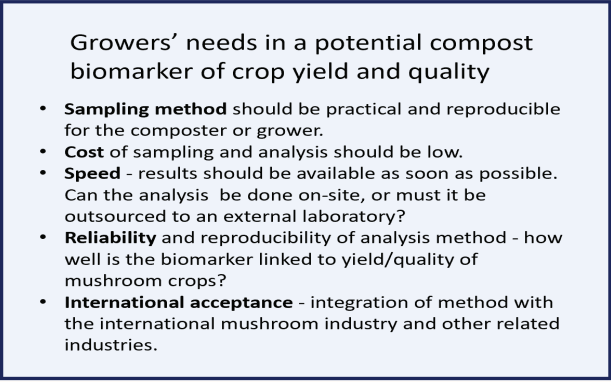MU17006 - Developing a database of bio-markers for compost quality control to maximise mushroom production yield
Key delivery partner: The University of Sydney
The quality and yield of button mushroom crops are critically dependent on the quality of compost used. Beginning in June 2019, this investment is exploring how microbial populations within compost can be used to understand, measure and manipulate compost quality.
The project team’s work involves investigating microbial populations across a range of mushroom composting facilities. This includes looking at the microbial population dynamics at different points along the composting timeline, how they align with other compost quality indicators and correlating everything back to mushroom crop yield and quality.
The research will culminate in a database of compost ‘bio-markers’ (microbe indicators) for the industry, which will be able to be used to assist in maximising productivity and crop outcomes.
-
Progress in this project was severely impacted by the COVID-19 lockdown in the second half of 2021, and work in this period was therefore limited to software development and training.
Sample collection at participating compost yards for the feasibility study recommenced in December 2021, and was completed by April 2022.
These samples represent a time-course from three successive crops at four independent mushroom composting facilities across New South Wales, Victoria and South Australia. Analysis of chemical compost quality markers in these samples (pH, moisture, total C and N, soluble C and N, microbial biomass, humification index, nitrification index) is nearly complete, and the microbial community analysis of these samples has been completed.
The results indicate good reproducibility between compost crops at Phase II but considerable variability between individual crops at earlier stages of the composting process, and this will be used to inform the design of the full scale compost biomarkers study.
-
Since project commencement, progress has been severely impacted by COVID-19 travel restrictions, leading to a temporary pause in research activites.
Restarting in January 2021, the team focused on developing effective and reproducible compost sampling strategies.
The initial phase worked to assess changes in microbial diversity and other compost quality parameters in three successive compost crops from yards in three different States. With sampling almost complete, the analytical methods required for analysis have been optimised.
The results from this study are now being used to prepare methods for a much larger one-year study.
Project outputs
Australian Mushrooms Journal, spring 2019 edition page 32

